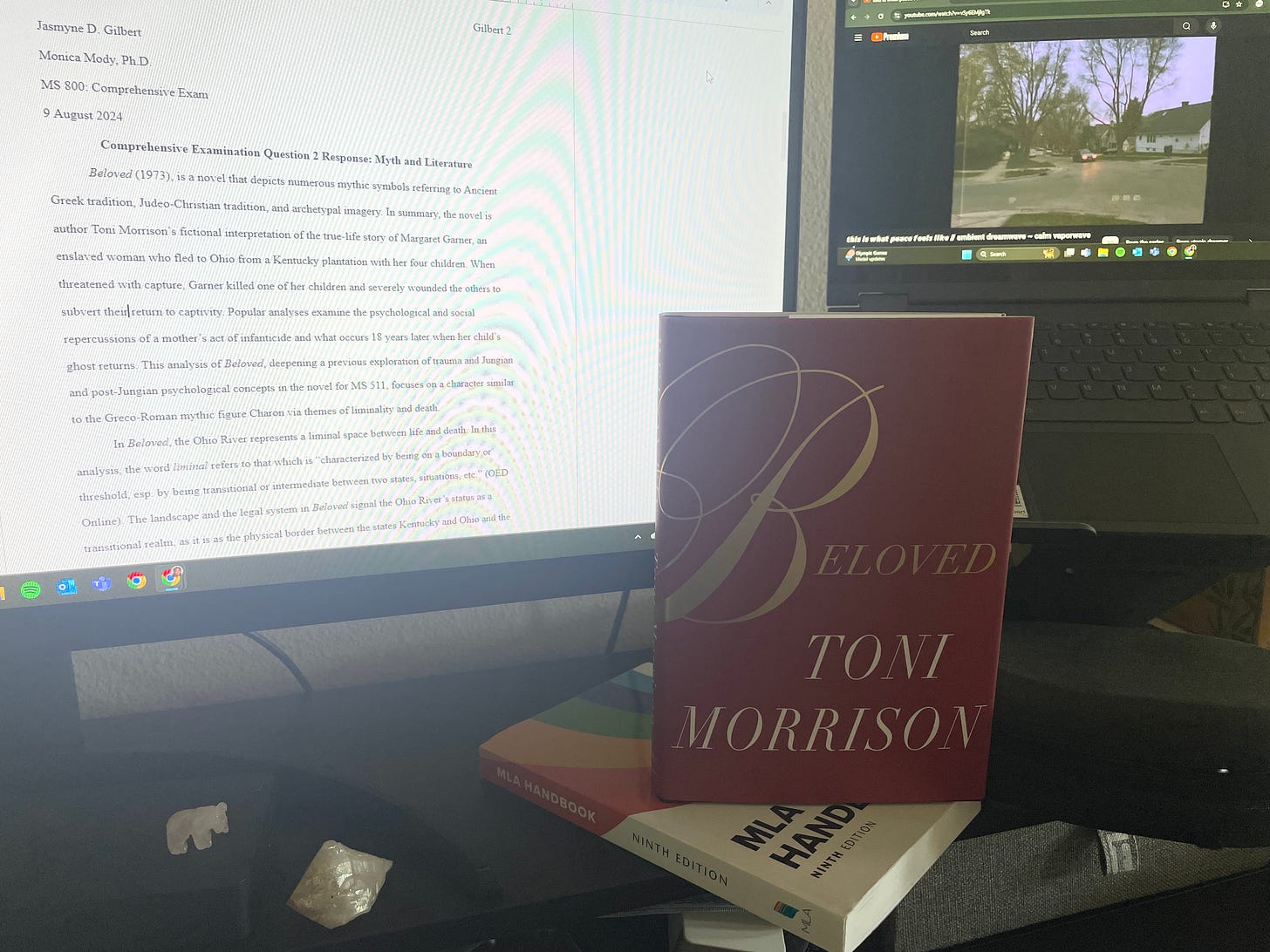Fly in the Buttermilk
Exploring the challenges of finding Black American representation in a predominantly white academic curriculum and the journey to self-education in Black myth and literature.
There is a professor in my program who, inadvertently I think, draws out my interest in my own Black American-ness. Their courses primarily cover white Western literature, art, and history, and when we talk about Black subject matter, it’s most often about African folks from the continent or Afro-Caribbean folks, but rarely Black Americans. I do not draw out this distinction in a xenophobic way or as some misguided exaltation of the “All-American” sentiment; I just want to see myself and my people reflected in what I’m studying more often1.
“The beauty of our glorious Capitol…”
“The genius of Walt Disney…”
“Our legacy…”
“Woman’s beauty” accompanied by an onslaught of art depicting only white women…
If you look at any of my course notes, you will see the evidence of an unfortunate truth: there comes a point during every session when I need to doodle to stay awake. So, after contending with relentless, exhausting whiteness for 6+ hours a day for four days in a row, I inevitably reached a boredom breaking point during class and needed to doodle to keep my eyes open. I even wrote the first draft of this dispatch during class, channeling my big feelings into writing as I tend to do.

I do not mean to disparage my professor or even the institution because I expected nothing less when I enrolled2. Lately, though, the exhausting European-ness of our curriculum and the realities of being a fly in the buttermilk have been grating on me. My frustration is essentially a question about belonging and whose thinking is worthy of propagating. I have not named the professor intentionally because I have come to hold deep affection and respect for them; they have taught me so much about aesthetics and world history, challenging my tendency to be simultaneously intellectually dismissive and arrogant. It’s just that their courses tend to epitomize everything I resent about education and predominately white institutions. When they telegraph the upcoming folktales course, they do not mention Zora Neale Hurston. They speak profusely and in encyclopedic detail about European and white American literature as if Toni Morrison didn’t exist. They opine at length about obscure European myths and religious histories as if Yvonne Chireau, Stephen Finley, and Anthony Pinn do not have published works. These are epistemological and pedagogical choices, and based on what makes it into the syllabi, Black American myth is an afterthought. So fuck it. I’ll do it myself.
Instead of picking on my professor, I want to focus on developing the resolve (resignation?) to study and write about the traditions of my own culture since it seems like it’s up to me to give myself that education. When I enrolled, I didn’t anticipate focusing my academic research on Black American myth and literature. In fact, part of my resistance to writing about Beloved four times and counting is because doing so feels predictable. Of course the Black girl studying myth would have Toni Morrison as a research interest. Do you see the mental hoops I’m making myself jump through? I’m frustrated by the curriculum, yet further exhausting myself by resisting a novel that seems to want something from me. “Do I contradict myself? / Very well then I contradict myself, / (I am large, I contain multitudes.)”3

To-date I’ve taken essentially three courses on Greek and Roman mythology, and just one about African and African Diaspora mythic traditions during which we did not discuss the rituals and religions that arose from slavery in the United States. Again, that is not a critique of the professor because I adored that class. We discussed Afrofuturism and worldbuilding inside contexts where power structures force Black folks to assimilate or move to the margins. It was so much fun and yielded beautiful reflections on water symbolism and the Diaspora that I’ve already shared4. I can recall just two assigned texts about Yvonne Chireau about Hoodoo/conjure from other courses, and a handful of texts by and about Black authors (primarily African and Caribbean). There was even one guest lecturer who assigned almost all readings by Black women because she has been conducting explicit research on conceptualizations of race in the Classics5. Still, I can’t help but feel like my mind and spirit are missing out on something.
I don’t mean this as a bratty, privileged tirade about how the very expensive advanced education I’m undertaking isn’t 100% tailored to my own interests. I don’t believe in the consumer model of education where we throw money at professors and they do exactly what we demand. Instead, I’m choosing to look at my own grievances as an opportunity to be accountable for my education and honor the legacies of Octavia E. Butler6 and Toni Morrison7 by making room for what I care about myself. It seems like if I want to learn about myth and religious cultures within Black American contexts, it’s up to me to figure that out on my own. I resent that fact but I cannot expect my professors to think how I think, or see what I see because they are not me. My education is my responsibility, and maybe that’s for the best.
Before the end of the course we spent a couple hours talking about Romare Bearden, thank goodness. We’d discussed his Black Odyssey series previously, so it was nice to delve into the explicitly Black American cultural influences on his work that we didn’t cover before.
See this post from October 2022 for more on the lack of representation in my program.
See “Song of Myself, 51” by Walt Whitman. https://poets.org/poem/song-myself-51
See “Soft as Water” for more information.
You should learn more about the brilliant Shelley Haley and watch the African Queens docu-series on Netflix. They’re quite good. https://www.hamilton.edu/news/story/shelley-haley-netflix-cleopatra-queen
See “Octavia Butler” on Charlie Rose in 2000 from https://charlierose.com/videos/28978
See 1981 September 27, The Cincinnati Enquirer, Writing Is Third Career For Morrison by Ellen Brown (Entertainment Reporter), Quote Page F11, Column 1, Cincinnati, Ohio. (Newspapers.com)






I've been thinking so much about academia lately. I strongly resonate with coping with classes by doodling. I also love your emphasis on how not just your mind but you felt that your spirit too was missing out on something. I wish the academy had more spirit infused into it. And I adore the language of "propagating" regarding pedagogy.
💙 "My frustration is essentially a question about belonging and whose thinking is worthy of propagating."